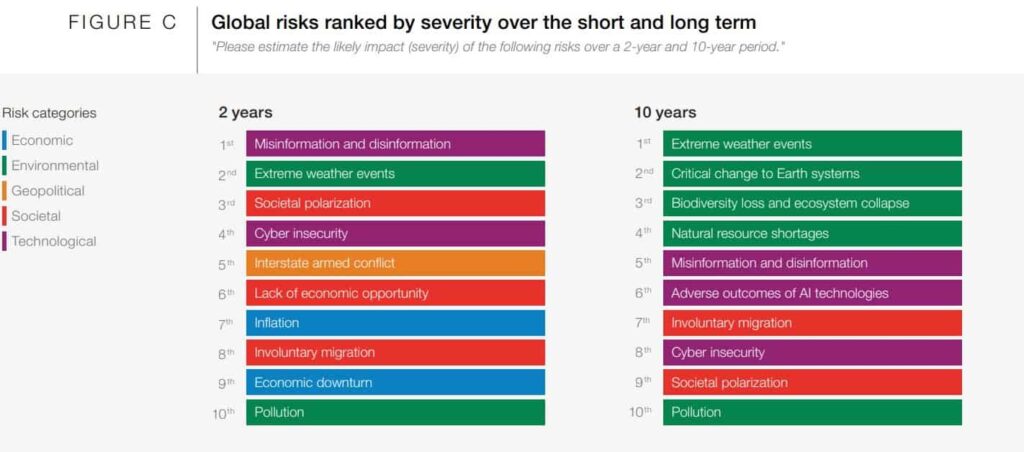News Source: TH
Recently, the World Economic Forum (WEF) has released the Global Risk Report 2024, highlighting some of the most severe risks we may face over the next decade, against a backdrop of rapid technological change, economic uncertainty, a warming planet and conflict.
- The report is based on a survey of nearly 1,500 experts, industry leaders and policymakers.
- The World Economic Forum says false and misleading information supercharged with cutting-edge artificial intelligence is the top immediate risk to the global economy

Key Highlights of the Global Risk Report 2024
| AI Powered Misinformation and Disinformation: | Misinformation and disinformation are listed as the most severe risks over the next two years, highlighting how rapid advances in technology also are creating new problems or making existing ones worse. It is concerning that the boom in Generative AI chatbots like ChatGPT means that creating sophisticated synthetic content that can be used to manipulate groups of people won’t be limited any longer to those with specialized skills. AI-powered misinformation and disinformation is emerging as a risk just as billions of people in a slew of countries, including large economies like the United States, Britain, Indonesia, India, Mexico, and Pakistan, are set to head to the polls in 2024 and next. |
| Geopolitical Shifts and Governance Challenges | A deeper divide between global powers, especially between the Global North and South, may lead to challenges in international governance. The growing influence of states in the Global South, combined with geopolitical tensions, could reshape security dynamics and impact global risks. |
| Economic Strains and Inequality | The cost-of-living crisis and economic risks such as Inflation and economic downturn are significant concerns for 2024. Economic uncertainty will disproportionately affect low- and middle-income countries, leading to potential digital isolation and worsening societal and environmental impacts. |
| Security Risks and Technological Advances: | Interstate armed conflict is identified as a new entrant into the top risk rankings over the next two years. Technological advances, especially in artificial intelligence, pose security risks as they enable non-state actors to access disruptive tools, potentially leading to increased conflict and crime. |
| Environmental Risks at the Forefront | Environmental risks, particularly extreme weather, dominate the risk landscape over all time frames. Concerns about climate change, biodiversity loss, and critical changes to Earth systems are evident, with potential irreversible consequences. |
| Structural Forces Shaping Global Risks | There are four structural forces shaping global risks over the next decade: Climate change, Demographic Bifurcation, Technological Acceleration, and Geostrategic shifts. These forces represent longer-term shifts in the global landscape, and their interactions will contribute to uncertainty and volatility. |
| Deteriorating Global Outlook: | Various global events in 2023, including lethal conflicts, Extreme Weather Conditions, and societal discontent, have contributed to a predominantly negative outlook. |
What is the World Economic Forum?
- The WEF is a Swiss nonprofit foundation established in 1971, based in Geneva, Switzerland.
- Recognized by the Swiss authorities as the international institution for public-private cooperation.
- Founder and Executive Chairman: Klaus Schwab.
- Some major reports published by WEF are: Energy Transition Index, Global Competitiveness Report, Global Gender Gap Report, Global Risks Report, Global Travel and Tourism Report.
- Objective: Committed to improving the state of the world by engaging business, political, academic, and other leaders of society to shape global, regional, and industry agendas.
What is Global Risk?
- Global risk is defined as the possibility of the occurrence of an event or condition which, if it occurs, would negatively impact a significant proportion of global gross domestic product, population or natural resources.
- The Global Risks Report is an annual study published by the World Economic Forum ahead of the Forum’s Annual Meeting in Davos, Switzerland.
What are the Recommendations?
- Localized strategies leveraging investment and regulation can reduce the impact of those inevitable risks that we can prepare for, and both the public and private sector can play a key role to extend these benefits to all.
- Single breakthrough endeavors, grown through efforts to prioritize the future and focus on research and development, can similarly help make the world a safer place.
- The collective actions of individual citizens, companies and countries may seem insignificant on their own, but at critical mass they can move the needle on global risk reduction.
- Even in a world that is increasingly fragmented, cross-border collaboration at scale remains critical for risks that are decisive for human security and prosperity.


